This easy pear sauce is made with pears, cardamom, lemon and honey, and is ready in about 30 minutes. Freeze it for later!
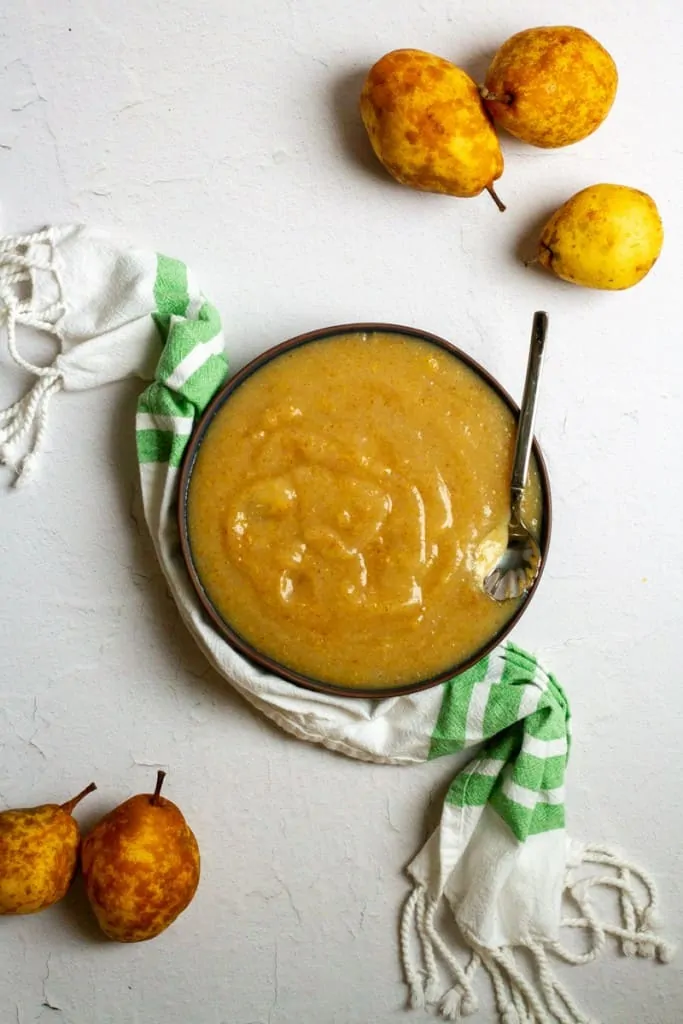
Who else loves pears?
This tasty fruit gets less love than apples, but I actually love them even more than apples.
When we lived in West Virginia, friends of ours had a prolific Bartlett pear tree but didn't like pears at all.
Sad for them, happy for me!
We ended up with lots and lots of pears from their tree.
More recently, a friend nearby in Kentucky gifted us with 15 pounds of pears from her tree. I did a little happy dance.
If you follow along with my Instagram stories, you probably saw me testing pear recipes with my most recent batch of pears.
Since I love making crabapple butter, I wanted to try making pear butter.
However, my first attempt at pear butter didn't go well (it burnt!), so I opted for the easier and faster (but equally delicious) pear sauce.
This pear sauce is a tasty twist on applesauce, and is seasoned with lemon, cardamom and honey.
Looking for more fall fruit recipes? Try these: persimmon smoothie, vegan apple pie, brown butter apple galette, puff pastry apple crostata, apple tartlets, and baked apple French toast.
Best Pears for Pear Sauce
There are lots and lots of different types of pears.
Some pears, such as D'anjou and Asian, are firm and crunchy like apples. These pears are perfect for eating raw and will keep their shape when making poached pears.
Other pears, such as the Bartlett pear, are soft when ripe and fall apart quickly when cooked. These pears can be a little less satisfying to eat raw, but are perfect for cooking.
That said, you can use any type of pear for pear sauce, but the crunchier ones might take longer to cook down.
Cooking Pears
If you've ever harvested wild pears, pears from a non-commercial orchard, or pears from a friend's tree, you might have heard them called "cooking pears."
Basically, cooking pears refer to pears that don't ripen well and are better cooked than raw.
These pears can often actually be ripened, but it takes a little effort. If you have "cooking pears," keep reading for tips on ripening them.
That said, if you find yourself with pounds and pounds (and pounds) of hard pears, you might simply want to use them quickly. You can use hard pears in this pear sauce without ripening them.
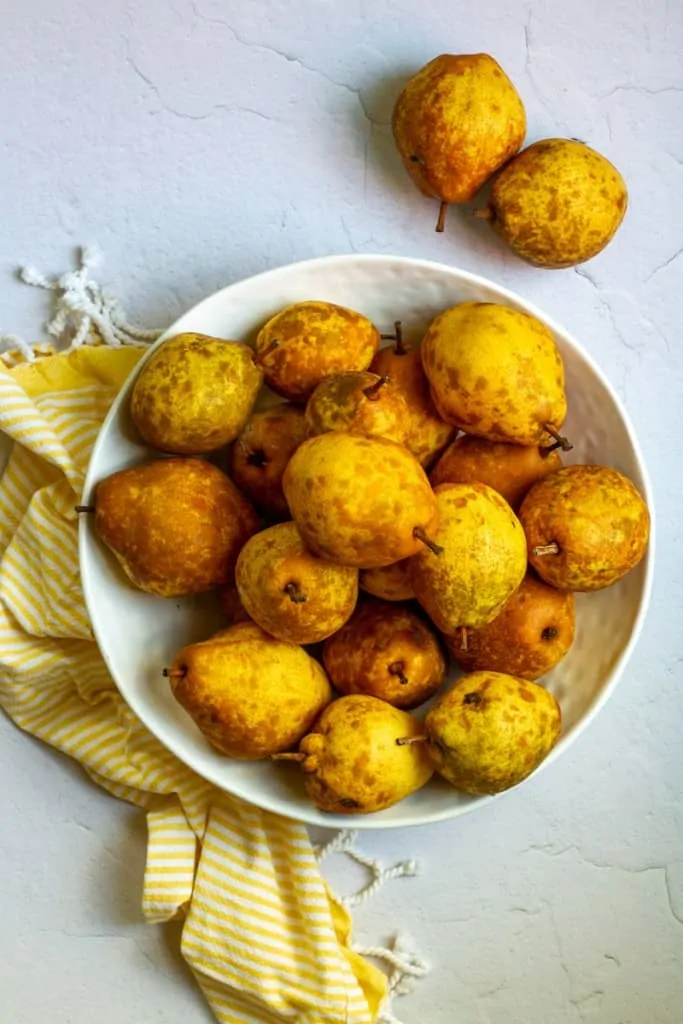
How to Ripen Pears
Pears are an unusual fruit in that they ripen off the tree after picking.
For store-bought pears, leave them at room temperature until they begin to soften around the stem.
Once they begin to ripen, they'll become overripe quickly. To preserve them longer, refrigerate until you're ready to use.
For home-picked pears, the advice should technically be the same. However, some varieties of pears will never ripen properly if they haven't been chilled first.
If your homegrown pears tend to go from rock-hard to rotten, try chilling them in the fridge for a week or so, then ripening on the counter.
However, if you don't have room in the fridge, you can use your hard, unripe pears in this recipe. They'll simply need a little extra sweetener.
Should I Peel the Pears?
It's up to you. I like to skip this step.
If you choose to leave the peels, you'll need access to a blender. I prefer to use an immersion blender for pear sauce.
Not sure if you should peel or not?
I leave the peels (because it's faster) for homegrown pears or organic pears.
If you're using store-bought, non-organic pears, you may want to peel them.
How to Make Pear Sauce
Start by coring your (peeled or unpeeled) pears.
Chop them up and add to a large pot.
Next, cut two lemons in half. Squeeze the juice into the pot with the pears and then add the lemon halves.
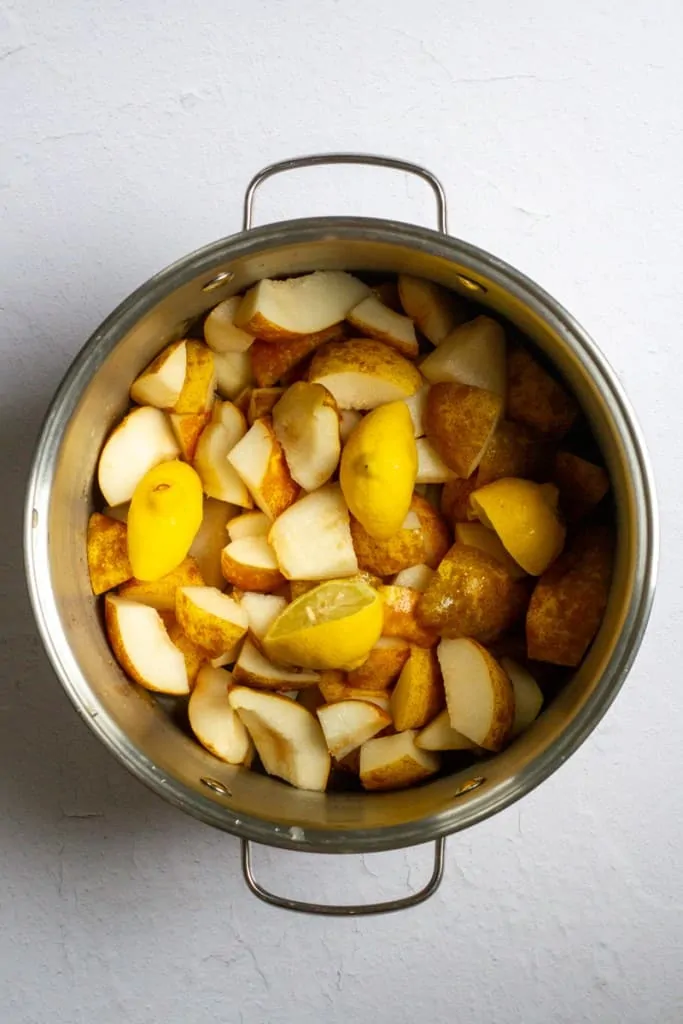
Add ¼ cup water and a little cardamom.
Don't have cardamom? You can buy cardamom online or swap in cinnamon.
Cover the pot and simmer until the pears start to break apart.
If the pear pieces aren't visibly falling apart after 20 minutes, try pushing against them with the back of a wooden spoon. If they fall apart, they're ready.
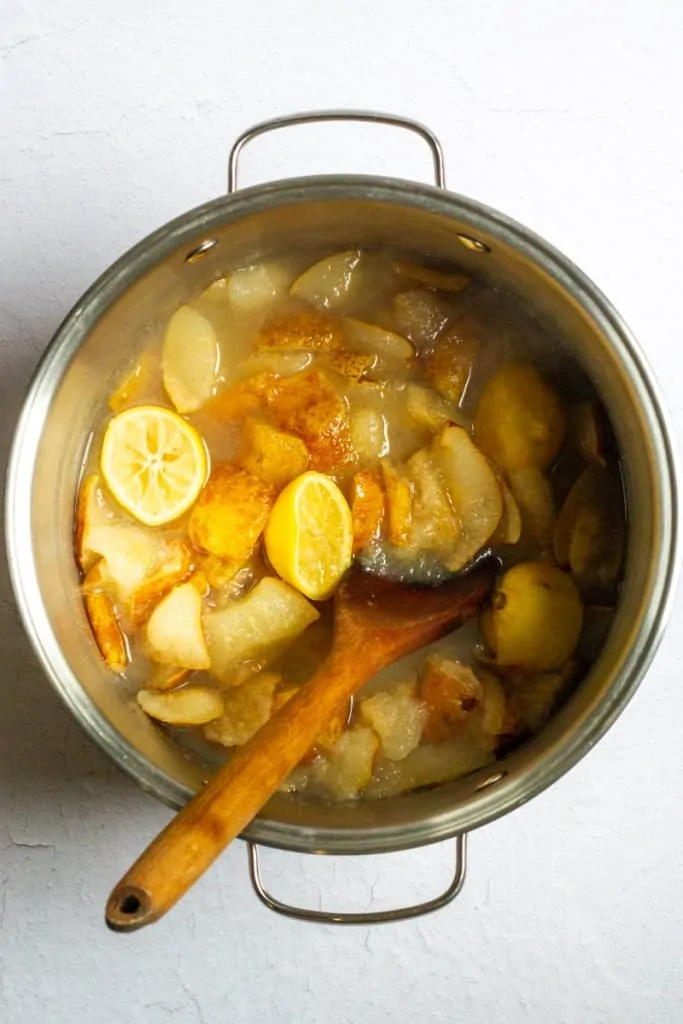
Remove the lemon halves from the pears.
Next, use an immersion blender (or ladle into a blender basin) and blend until smooth. I use a Cuisinart immersion blender.
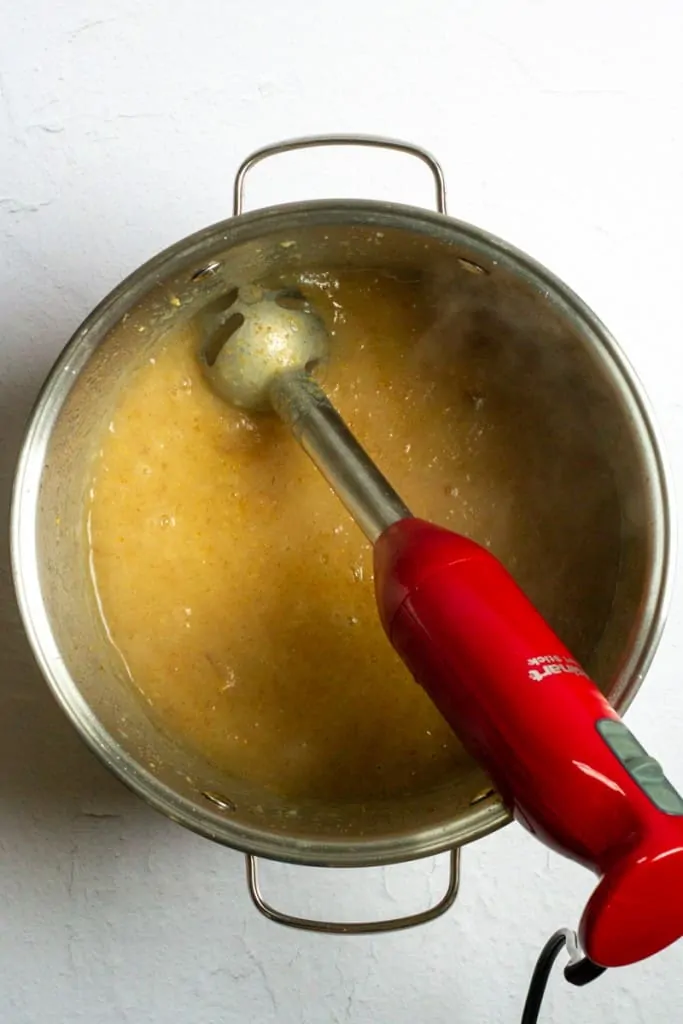
Sweeten the Pear Sauce (Or Not)
At this point, taste the pear sauce.
If your pears were ripe and sweet, you might not need to add any sweetener at all!
However, if the pears were unripe or simply weren't very sweet to begin with, you'll probably want to add some honey or sugar.
How to Store + Use This Pear Sauce
Store this pear sauce in the fridge or freezer.
This recipe has not been tested for canning.
Enjoy this pear sauce any way you'd normally use applesauce! We love it as a snack or side dish.
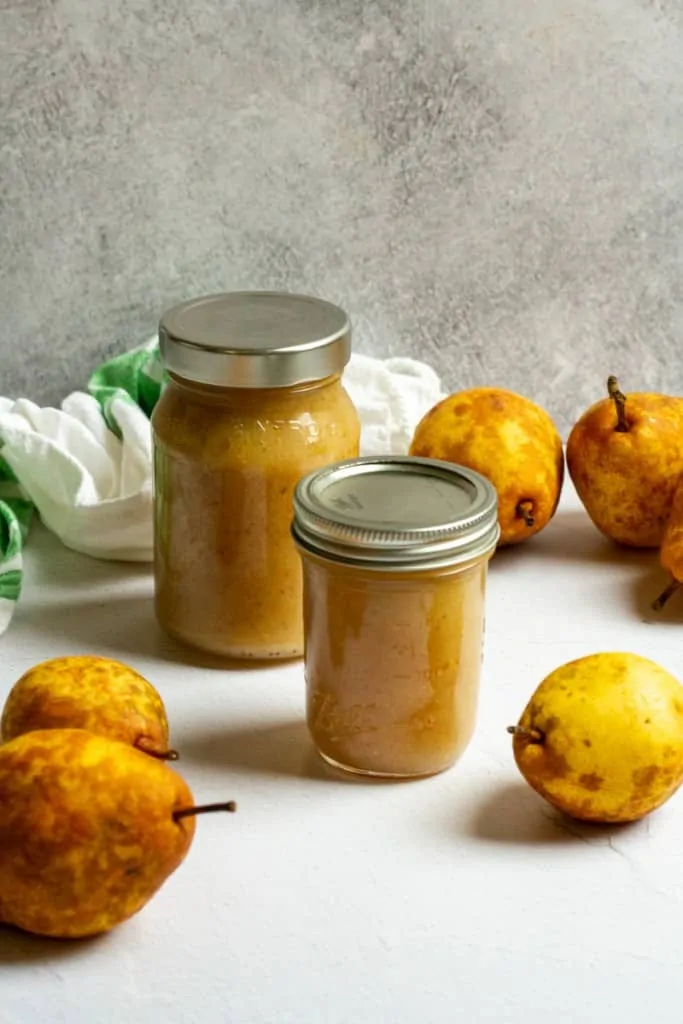
Pear Sauce
Equipment
Ingredients
- 4 pounds pears (8-10 pears) I used Bartlett pears
- 2 lemons, rinsed + halved
- ½ teaspoon ground cardamom (or 3 cardamom pods) Or swap cinnamon
- ¼ cup water
- ¼ cup honey (more or less, to taste), optional
Instructions
- Core pears and roughly chop. If desired, peel the pears. Peeling is optional (if you have a blender). If you do not have a blender, make sure to peel the pears before proceeding.Add the chopped pears to a large pot. Squeeze the lemon halves over the pears, and then set the lemon halves in with the pears. Add cardamom and ¼ cup water.
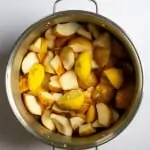
- Cover pot and bring the liquid to a simmer over medium heat. Simmer for about 20 minutes, or until the pears easily fall apart when you press against them with the back of a wooden spoon.
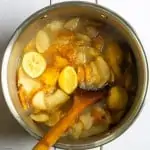
- Remove the lemon halves.Blender Method: Use an immersion blender to purée the pear sauce. Alternatively, ladle the pears and liquid into a blender basin and blend.No Blender Method (Peeled pears only): Use a potato masher or ricer to mash the pears. This method may require a longer cook time because the pears need to be more tender.
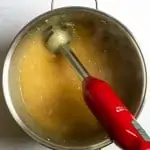
- Taste the pear sauce and sweeten with honey (or sugar) if desired. Keep in mind that once the pear sauce is cold, it will taste less sweet than when warm.Transfer the pear sauce into glass jars. Storage: Refrigerate and use within 10 days or freeze and use within nine months.
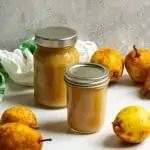

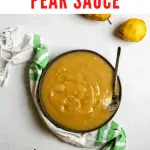
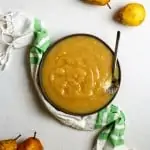
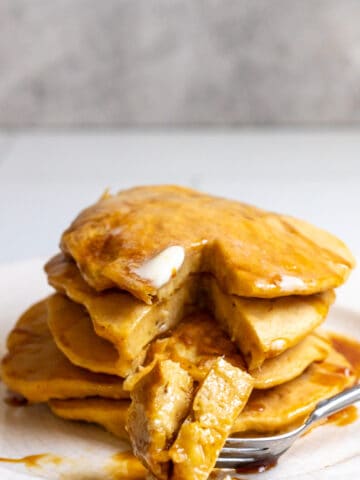
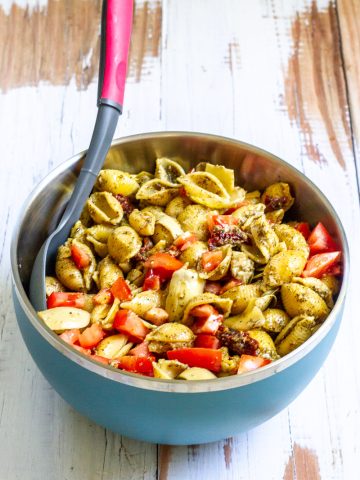
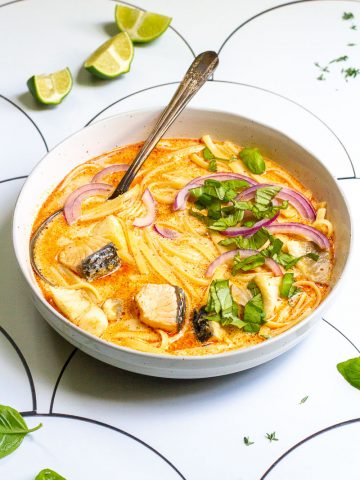
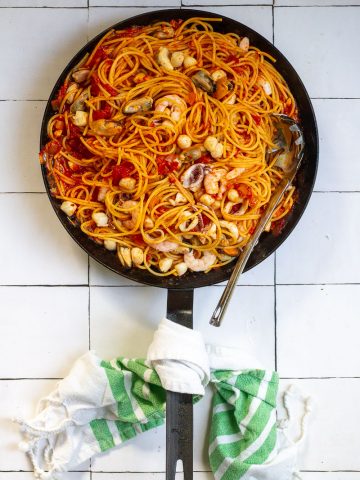
Alisha Trenalone
I made three big batches of this with a bunch of home-grown pears, and it tastes great! Will definitely be freezing it for later. Good way to process lots of pears before they go bad.
Jmch
Way too much lemon. It overpowers the taste of the pears.
Alisha Trenalone
We're sorry this sauce tasted too lemony to you! Our testers haven't had an issue with the lemon juice when trialing this recipe... If the proportions from the recipe card are followed between pears, honey, and lemon juice, it generally results in a nice balance of sweetness and just a little tartness. That said, everyone's taste can be different – and the size of the fruit could make a difference too!
-Alisha at Champagne Tastes